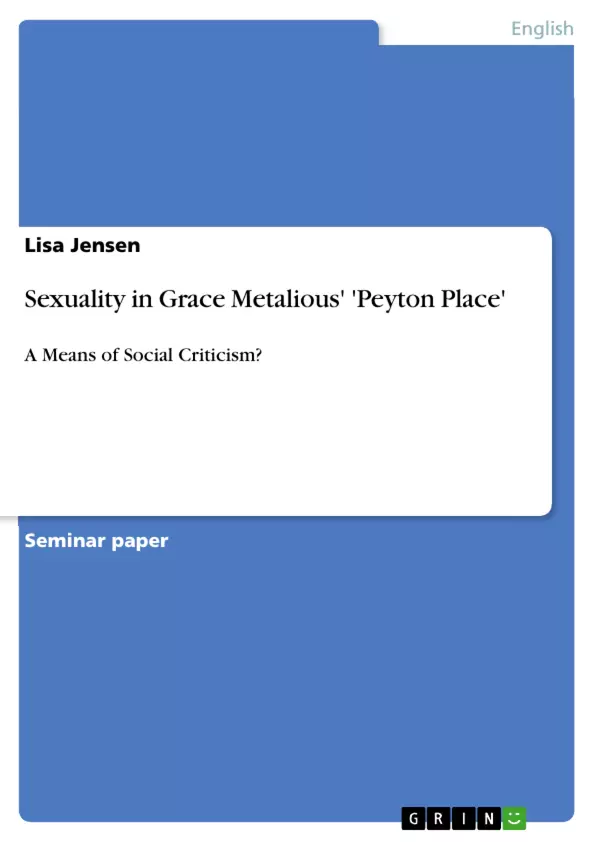The (in 1956) outrageous contents of the novel Peyton Place, of which a lot are of a sexual kind, were the reason why the book became famous. The main characters, Allison MacKenzie, her mother, Constance MacKenzie, and Selena Cross are introduced one after another, as well as a couple of other characters, that live in the small town called Peyton Place. The essay examines the sexual relations of the characters and to what extent these convey social criticism.
Table of Contents
- Introduction
- Peyton Place: Introduction to the Main Characters
- Sexual Repression and Sexual Self-indulgence
- Constance MacKenzie: From Sexual Repression to Liberation
- Selena Cross: Virtue of Mind
- Peyton Place: Social Criticism
- Conclusion
Objectives and Key Themes
The author's main objective is to analyze Grace Metalious' novel "Peyton Place" and examine how the author utilizes sexuality as a means of social criticism. The work explores various aspects of sexual behavior and their consequences within the context of the 1950s.
- Sexual repression and its impact on individuals
- The dangers of sexual self-indulgence
- The role of society in shaping and judging sexual behavior
- The importance of women's control over their own sexuality
- The consequences of sexual abuse and the need for justice
Chapter Summaries
- Introduction: This chapter introduces the novel "Peyton Place" and its author, Grace Metalious. It highlights the controversial nature of the novel's content, particularly its focus on sexuality. The chapter also introduces the main characters, including Allison MacKenzie, Constance MacKenzie, and Selena Cross, and establishes the setting of the small town called "Peyton Place."
- Peyton Place: Introduction to the Main Characters: This chapter delves into the individual stories of the main characters, focusing on their experiences with sexuality. Allison MacKenzie, initially repressed, faces her own sexual awakening and struggles with unrequited love. Constance MacKenzie, a mother burdened by a secret from her past, gradually finds her own sexual liberation. Selena Cross, a young woman subjected to sexual abuse, ultimately finds strength and justice. The chapter explores the impact of social norms and expectations on these characters' lives and their experiences with sexuality.
- Sexual Repression and Sexual Self-indulgence: This chapter examines the consequences of both sexual repression and self-indulgence. The author analyzes the character of Norman Page, who suffers from repressed sexuality due to his mother's strict upbringing. The chapter also contrasts this with the characters of Rodney Harrington and Betty Anderson, who engage in self-indulgent sexual behavior with negative consequences.
- Constance MacKenzie: From Sexual Repression to Liberation: This chapter focuses on the character arc of Constance MacKenzie, illustrating her journey from sexual repression to liberation. The chapter emphasizes how her past experiences shape her present and how she eventually finds comfort and self-acceptance through her relationship with Tomas Makris. The chapter highlights the importance of open communication and honesty in achieving sexual freedom.
- Selena Cross: Virtue of Mind: This chapter examines Selena Cross's strength and resilience in the face of sexual abuse. Despite her traumatic experiences, she maintains her self-respect and dignity. The chapter also explores the broader societal responsibility for Selena's situation, highlighting how the community's apathy and lack of action contributed to her suffering. Selena ultimately finds justice through legal proceedings and her own actions, though not without personal loss.
- Peyton Place: Social Criticism: This chapter analyzes how the novel "Peyton Place" uses sexuality to critique social norms and structures. The author argues that Metalious utilizes the characters' experiences to highlight the hypocrisy and double standards that existed regarding sexual behavior in the 1950s. The chapter examines how Metalious challenges societal expectations and advocates for women's rights to participate in sexual activity and control its consequences. The chapter also discusses how the novel's focus on sexual abuse and its aftermath sheds light on the need for justice and social change.
Keywords
The main keywords and focus topics of the text include sexual repression, sexual self-indulgence, social criticism, gender roles, societal expectations, sexual abuse, women's rights, and the consequences of sexual behavior.
- Citar trabajo
- B.A. Lisa Jensen (Autor), 2010, Sexuality in Grace Metalious' 'Peyton Place', Múnich, GRIN Verlag, https://www.grin.com/document/181270



